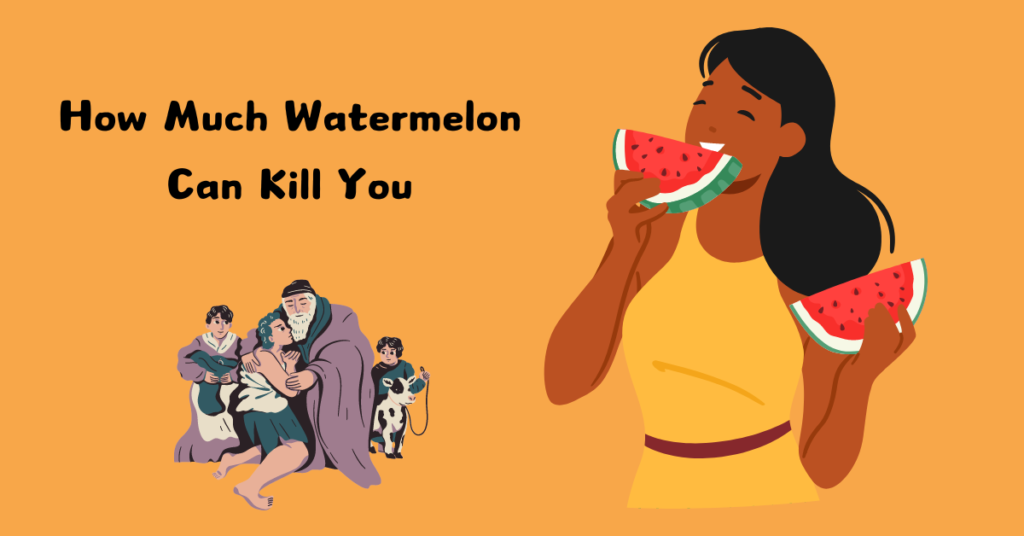Summer days are here and melons are coming in the market. It’s a favorite summer fruit, with its refreshing sweetness and hydrating properties, so some people wonder if we’ll ever find out. “People can die by eating it”
so in this article we will know the benefits and harms of melon and how much melon can a person die from eating and what can a person not eat after eating melon so let’s know how melon is harmful to human.
How Much Watermelon Can Be Harmful?
To place things into viewpoint, it would take an extraordinarily enormous measure of watermelon to arrive at possibly unsafe degrees of potassium admission.
The typical grown-up would have to drink a few kilograms of watermelon in a brief period to move toward hazardous potassium levels. This sum far surpasses what the vast majority would normally eat at a time or even in a day.
The Dangers of Overeating
Aside from the potassium concern, indulging watermelon can prompt other stomach related distresses because of its high fiber content. Polishing off huge amounts of fiber-rich food sources like watermelon in a brief period can cause bulging, gas, and loose bowels, especially in people not familiar with a high-fiber diet.
Myth vs. Reality: Can Watermelon Really Kill You?
The idea that watermelon can be deadly on the off chance that drank in huge amounts is to a great extent a fantasy. While inordinate utilization can prompt distresses like bulging and the runs, the body’s normal components keep the vast majority from indulging so much that it becomes hazardous.
How much watermelon can a person die from eating?
An individual would regularly not kick the bucket from eating watermelon because of its high water content and moderately low calorie thickness. Watermelon is made out of around 90% water, which makes it very hydrating and low in calories contrasted with its volume.
To ingest a deadly measure of watermelon, an individual would have to polish off a very enormous amount, which is basically difficult to do in a solitary sitting because of the stomach’s ability and the body’s regular systems that forestall overconsumption.
Nonetheless, as with any food, unreasonable utilization might actually prompt uneasiness, for example, swelling or stomach related issues, however not to a deadly degree exclusively because of the actual watermelon.
What can a person not eat after eating watermelon?
Subsequent to eating watermelon, an individual can’t eat its seeds. Watermelon seeds are for the most part not prescribed for utilization because of their hard external shell and likely stomach related issues whenever ingested in enormous amounts. In any case, the tissue and squeeze of watermelon are protected and beneficial to drink.
Hyperkalemia: Understanding the Risks
Watermelon is viewed as a moderate wellspring of potassium, with roughly 170 milligrams for each cup. While this is by and large not a worry for a great many people, people with specific ailments, for example, kidney illness or those taking prescriptions that influence kidney capability,
may have to intently screen their potassium consumption more. Extreme potassium in the blood can disturb typical heart rhythms and, in serious cases, lead to heart failure.
Understanding Watermelon’s Composition
Watermelon is made principally out of water (around 92%), which adds to its low carbohydrate level regardless of its sweet taste.
A run of the mill serving (around 1 cup of diced watermelon) contains something like 46 calories, which goes with it a famous decision for those watching their calorie consumption.
What Makes Watermelon Popular?
Watermelon, scientifically known as Citrullus lanatus, is aptly named for its high water content, making it a really perfect choice to quench thirst on hot days.
This fruit isn’t only hydrating but additionally packs critical vitamins which includes vitamins A, C, and B6, as well as antioxidants like lycopene and citrulline.
Lycopene, specially, is understood for its capacity health benefits, inclusive of decreasing the danger of positive cancers and improving coronary heart health.
Health Benefits of Watermelon
Watermelon is not as it were delightful but moreover offers a few wellbeing benefits due to its supplement substance. Here are a few key wellbeing benefits of watermelon:
Hydration: Watermelon is composed of almost 92% water, making it an great choice to offer assistance you remain hydrated, particularly amid hot climate or after exercise.
Rich in Supplements: It’s a great source of vitamins A and C, both of which are vital for skin wellbeing and resistant work. It too contains noteworthy sums of vitamins B1 (thiamine) and B6 (pyridoxine), as well as potassium and magnesium.
Antioxidant Properties: Watermelon is wealthy in cancer prevention agents such as lycopene, beta-carotene, and cucurbitacin E. Lycopene, in specific, is known for its potential to offer assistance ensure cells from harm and may have cardiovascular benefits.
Heart Wellbeing: Thinks about propose that diets wealthy in lycopene may offer assistance decrease the chance of heart malady. Potassium, show in watermelon, can offer assistance keep up sound blood weight levels.
Hydration and Work out Recuperation: Due to its tall water substance and renewing electrolytes like potassium, watermelon can be useful for rehydration after exercise.
Digestive Wellbeing: Watermelon contains fiber, which is critical for stomach related wellbeing. Fiber advances normal bowel developments and can offer assistance anticipate clogging.
Skin and Hair Benefits: The vitamins A and C in watermelon are basic for solid skin and hair. Vitamin C makes a difference the body create collagen, a protein that keeps your skin supple and your hair strong.
Anti-inflammatory Properties: A few compounds in watermelon, such as cucurbitacin E, have been examined for their potential to decrease inflammation.
Weight Administration: Watermelon is moo in calories (approximately 46 calories per glass) and fat-free, making it a great choice for those looking to oversee their weight.
To appreciate the wellbeing benefits of watermelon, incorporate it as portion of a adjusted eat less nearby other natural products and vegetables.
FAQs About Watermelon Consumption
-
Can you eat watermelon every day?
Indeed, watermelon can be delighted in day to day as a component of a decent eating routine. Its low calorie and high water content make it a reviving and solid nibble decision.
-
Is it safe to eat watermelon with seeds?
Indeed, watermelon seeds are protected to eat and are really a decent wellspring of protein, sound fats, and micronutrients. Be that as it may, certain individuals favor seedless assortments for comfort.
-
Can watermelon cause allergic reactions?
Allergic reactions to watermelon are uncommon but viable. Symptoms may include itching, swelling, or problem respiratory. If you observed an allergic reaction, consult a healthcare expert.
-
How should watermelon be stored to maintain freshness?
Store uncut watermelon at room temperature for up to 2 weeks. Once cut, store it within the fridge and devour within three to four days for exceptional fine.
-
Can watermelon interact with medications?
Watermelon is generally safe to eat at the same time as taking most medications. However, when you have issues, seek advice from your healthcare company, specifically if you have kidney issues or take medications that affect potassium stages.
Conclusion
In conclusion, whereas the thought of watermelon being deadly if eaten in huge amounts is a well known myth, like all foods, control is critical. Watermelon is a tasty and nutritious natural product that can be delighted in frequently as portion of a solid count calories.
Its tall water substance makes it an fabulous choice for hydration, especially amid hot climate. By understanding its composition and potential dangers related with overconsumption, you can proceed to appreciate watermelon securely and responsibly.
Next time you ponder, “How much watermelon can murder you?” keep in mind that it’s more almost getting a charge out of this summer enchant in balance or maybe than dreading its potential perils.



